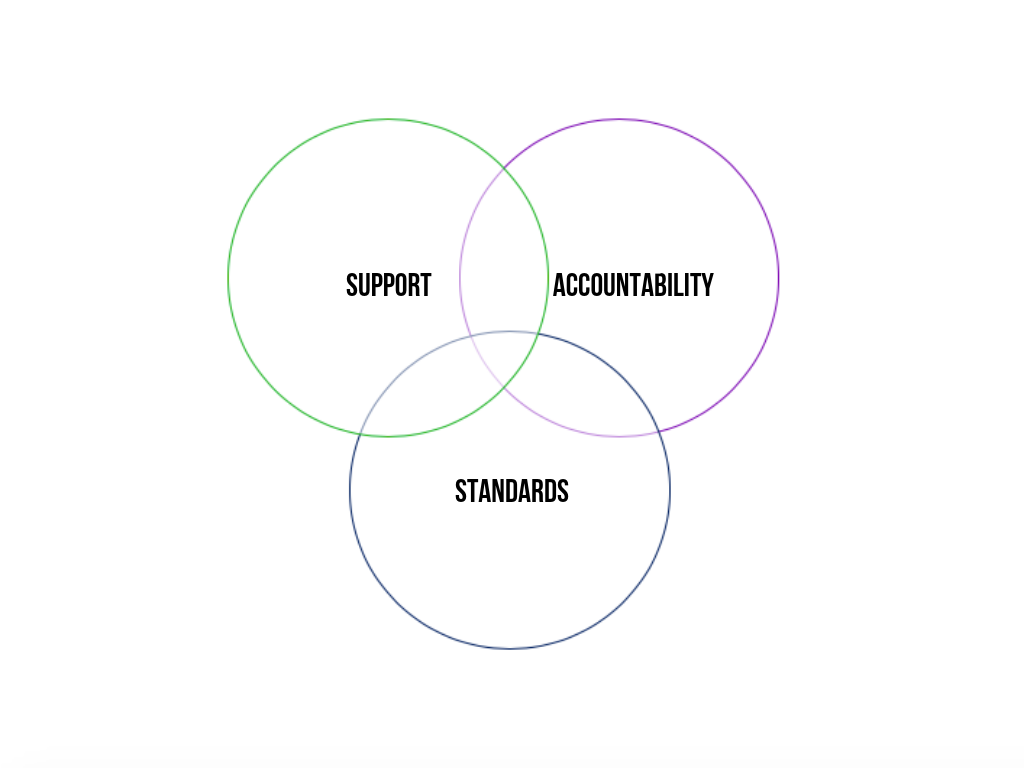If you want traction for change among individuals in your organization, it is only when there are clear standards of performance or behavior, accountability to meet them, and support to help people succeed that a change can take hold. In my experience, a deficit in any one of these three will alter the way any change is treated and viewed, and will lose traction as a result.

How a change will be treated and viewed depends on which of among support, accountability, and standards is in deficit.
- When accountability is lacking, despite clear standards of behavior and performance and ample support to succeed, change becomes no more than an extracurricular activity.
- When a standard of performance and behavior is unclear or inconsistent, despite processes for holding people accountable and ample investment in support, change becomes an exercise in lip service.
- When you have clear accountability and standards but insufficient support, change becomes a meat grinder.
How do these happen? Read on and I explain.
1. Change as an extracurricular activity. The value of support to change or improve is diminished when accountability is lacking, regardless of ample support and a clear standard of performance and behavior.
More than one global company I know makes English the internal language of business—even in the Japan office—yet only a handful I know have achieved success. In most companies, the standard for English capability is clear and the best among them provide multiple options for support both formal and informal to help people succeed, whether classes, private instruction, or stints abroad. One company I know even provides any employee nine months paid leave to go to the United States to study English.
Yet, despite ample and generous support to help people achieve a standard of performance or capability, in companies where accountability for meeting the standard is lacking, staff view improving English capability as an extracurricular activity separate from the rigors of their day job. In such companies, employees can often still progress in their careers without English ability. In my experience, only a minority ever take advantage of the support and even fewer achieve the standard.
In more than one company I know, it was only after implementation of a requirement for English ability for anyone in a director-level position that more junior employees began to take developing English capability seriously. HR also began to treat English as a requirement—not just a “nice-to-have” ability in candidates.
If you find that any change you are trying to achieve in your organization is being treated like an extracurricular or voluntary activity, have a look at accountability. Share on XIt is likely that insufficient accountability is causing the lack of traction.
2. Change as a lip service. When standards of behavior and performance are left wanting, systems and processes for holding people accountable lose meaning and investment in support achieves little return. Change is viewed merely as a passing fad. Just going through the motions with a good attitude is enough to get through.
At a Japanese company I know, despite elaborate systems for holding people accountable and ample investment in support for change, standards are fluid. Each change the leadership attempts to make is greeted with at least feigned enthusiasm and pro-forma participation in support activities like strategy development workshops and sales training sessions—only to return to establish patterns of behavior and performance and the results these entail.
Staff are ostensibly held to account in formal reviews. However, these matter little as there are no clear or consistent standards—not for performance for sales staff or staff in other functions, nor for performance in a leadership position. It is attitude, displays of effort, likability, and seniority that count most. The company’s leaders are reluctant to impose standards to avoid disrupting a culture of collegiality.
Poor managers are indulged for years because they are nice people and loyal employees—that is until the results of their underperformance become too much for the business’s leaders to abide. By then, the damage has been done. Underperforming sales staff are tolerated for years because they have great attitudes and make a good effort.
Some staff who are seriously good at their jobs get overlooked for promotion, for it is not behaviors and results that count the most, but rather collegiality. Their excellence makes others suspicious, and they become less than “likable.” Such employees often leave to join a competitor where excellence counts.
While the company is profitable, it chronically underperforms. Similar companies in their industry that were established during the same post-war period have far outstripped its growth. The more successful companies impose standards—at least with greater consistency.
If you find that change in your organization is only given lip service, check your standards. Are they clear? Are they consistently applied? Do they matter when people are held to account, or do mitigating circumstance frequently take priority?
3. Change as a meat grinder. No matter how compelling accountability or reasonable standards might be, any significant change for support is lacking and becomes onerous and painstakingly slow when it does not need to be so. If you have clear accountability and standards but insufficient support, change becomes a meat grinder.
The CEO of the Japan office of a major global consumer goods company was facing an onslaught of problems resulting from returned unsold inventory from distributors. Even though he changed the bonus system to incentive salespeople to maximize sell-through, they continued to stuff the pipe so-to-speak or were otherwise turned away by distributors to buy new product when salespeople declined to accept returns of unsold stock from the previous season.
The sales team did not need an incentive to change, they needed a better method. The monetary incentives alone made no difference. The mounting pressure to change without the support or means to do so merely resulted in frustration, resentment, and staff turnover with little progress against business objectives. It was not until the CEO organized support for reforming sales method that progress was made and the problem was resolved.
If the change you seek has become a meat grinder in your organization, look at what is being done to support the transition. Enhanced accountability, whether positive like monetary incentives or some kind of negative penalty, is no ersatz for appropriate support.
Change Traction Sweet Spot
Are you finding that change amongst your people is not taking hold the way you would like? Do any of the organization types I describe above resemble what you are seeing in your own business? Look first at the three pillars of standards, accountability, and support. Ensure sufficiency in all three. Change traction is up to you.



